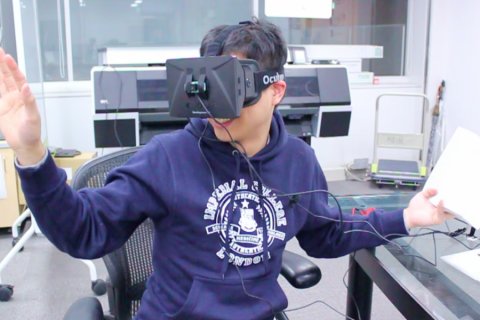
MIT Media Lab projects
Each Media Lab faculty member and senior research scientist leads a research group that includes a number of graduate student researchers and often involves undergraduate researchers.
- Advancing wellbeing using new ways to communicate, understand, and respond to emotion.
- Enhancing human physical capability.
- Making the invisible visible–inside our bodies, around us, and beyond–for health, work, and connection.
- Enabling dynamic, evolving places that respond to the complexities of life.
- Creating, deploying, and evaluating tools and practices that foster civic participation and the flow of information within and between communities.
- Sparking imagination and discussion about the social, cultural, and ethical implications of new technologies through design and storytelling.
- Integrating digital interfaces more naturally into our physical lives, enabling insight, inspiration, and interpersonal connections.
- Exploring how social networks can influence our lives in business, health, governance, and technology adoption and diffusion.
- Engaging people in creative learning experiences.
- Enhancing mobile life through improved user interactions.
- Transforming data into knowledge.
- Designing for, with, and by nature.
- Engineering at the limits of complexity with molecular-scale parts.
- Changing storytelling, communication, and everyday life through sensing, understanding, and new interface technologies.
- Extending expression, learning, and health through innovations in musical composition, performance, and participation.
- Building socially engaging robots and interactive technologies to help people live healthier lives, connect with others, and learn better.
- Designing systems that become experiences to transcend utility and usability.
- Augmenting and mediating human experience, interaction, and perception with sensor networks.
- Reimagining the way society organizes, cooperates, and governs itself.
- Creating sociotechnical systems that shape our urban environments.
- Building systems solutions for social change.
- Revealing insights into the human condition and repairing brain disorders via novel tools for mapping and fixing brain computations.
- Seamlessly coupling the worlds of bits and atoms by giving dynamic physical form to digital information and computation.
You might also like

Hyper-Lab Project

MIT Media Lab

MIT Media Lab project: Crystal Ball
|
The Sorcerers and Their Apprentices: How the Digital Magicians of the MIT Media Lab Are Creating the Innovative Technologies That Will Transform Our Lives Book (Crown Business) |

MIT Media Lab Project

Two Hands Project: Willoughby and Baltic and MIT Media Lab

|
XO 7-Inch Kids Tablet XO-880 (8GB) Personal Computer (XO)
|

|
Makeblock mBot Educational Robot Kit for Kids Blue(2.4G Hz Version) PC Accessory (Makeblock)
|






